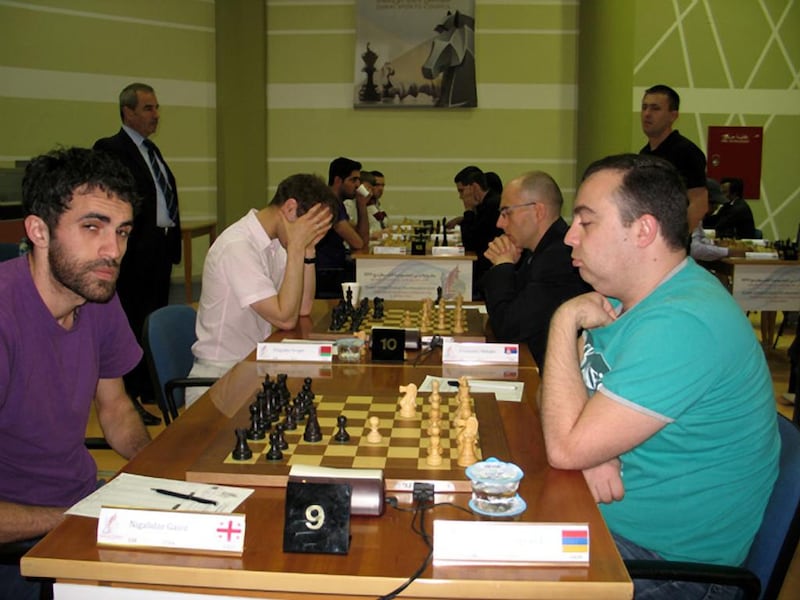DUBAI // As leading grandmasters played off for a US$12,000 (Dh44,000) first prize at the Dubai Open on Tuesday night, global attention remained centred on the gentlemen’s toilets at the Dubai Chess and Culture Club in Mamzar.
Gaioz Nigalidze, a grandmaster from Georgia, was expelled from the tournament after he was found to be cheating via a chess app on a smartphone hidden in a toilet cubicle.
Recently passed regulations mean he could face a 15-year ban from the game.
With the increased ubiquity of smartphones, technologically aided cheating has become a threat to the integrity of chess.
According to Yahya Mohammed, the tournament director who passed down the sanction, even basic mobile-phone chess apps can equip a standard player with enough of an advantage to beat the best players.
“These engines have all previous games logged in a database, which are available to everybody,” he said.
“A really good player might decide the right move after half an hour or an hour, but there is a time limit. A computer engine could decide the move in minutes, or seconds. It is an unfair advantage.”
In 2013, the governing body of chess set up an anti-cheating committee as “no one wants to be associated with a sport whose results can easily be affected by computer-assisted cheating”.
New guidelines forbidding players access to smartphones have been in force since last year, but it remains difficult to police.
Some tournaments have staff deployed outside toilets with electronic wands to scan players for mobiles and tablet devices.
Such preventive measures are not present at the Dubai competition. Signs saying mobile phones are prohibited are unmissable on the entry doors into the competition hall, but entry is free and easy.
The day after the cheating incident, another player was an instant loser when his telephone rang mid-match.
The organisers accepted it had been absent-mindedly left on and was not being used to access help.
“An incident like this may look bad for chess, but I don’t think this is bad publicity for our tournament,” Mohammed said.
“We want the players to be comfortable. Our club is specially made for chess, which is not always the case at all tournaments.
“It is very difficult to prove somebody is cheating, even if players express suspicions to the chief arbiter. In this case, we were able to.”
Mohammed said he was aware of tournaments that have airport-style scanners at the entrance. “Even with that, you can’t catch everybody,” he said.
The Dubai Open has a total prize fund of $50,000, with 39 grandmasters among its 155 players from 39 countries.
For low-ranking, professional chess players such as Nigalidze, the Georgian national champion for the past two years, victory represents a significant pay cheque.
Tigran Petrosian, an Armenian grandmaster, raised doubts about his Georgian opponent to the chief arbiter Mahdi Abdul Rahim, during their Round 6 match.
“Nigalidze would promptly reply to my moves and then literally run to the toilet,” Petrosian was quoted as saying by a Russian chess website.
There are 24 CCTV cameras in operation at the Dubai Chess and Culture Club — none are trained on the inside of the toilet cubicles. Nigalidze consistently used the second of four cubicles in the men’s toilets to the left of the entrance foyer at the club, which are a short walk from the tables where the matches were taking place.
“The last time he went, he was in there for maybe 10 to 15 minutes — with no flush,” Mohammed said. “Nobody uses the toilet for 15 minutes without once flushing.
“Obviously, I don’t have cameras in the cubicles, but when he came out I asked the cleaner to go in and check.”
The device was discovered wrapped in toilet paper and hidden in the bin. The tournament director double-clicked the button on the front of the iPhone to display all of the programmes that were open.
One showed Nigalidze’s Facebook account — despite the player’s denials that the phone was his — while a chess app was also open.
The configuration of pieces shown matched the scorecard the players were keeping.
“He went off, then 10 minutes later he came back and all he did was ask if he could have his phone back,” Mohammed said about confronting the player.
The organisers said they received a prompt apology from the Georgian chess federation, while Nigalidze’s compatriot, roommate and translator for this trip, Mikheil Mchedlishvili, continued playing his matches.
“We always have a very good relationship with the Georgian federation,” said Mohammed El Husseiny, the executive director of the Dubai Chess and Culture Club.
“They sent us a message with a formal apology and we do not hold anything against them. This was somebody acting on his own.”
[ pradley@thenational.ae ]
FOLLOW US ON TWITTER @NatSportUAE






